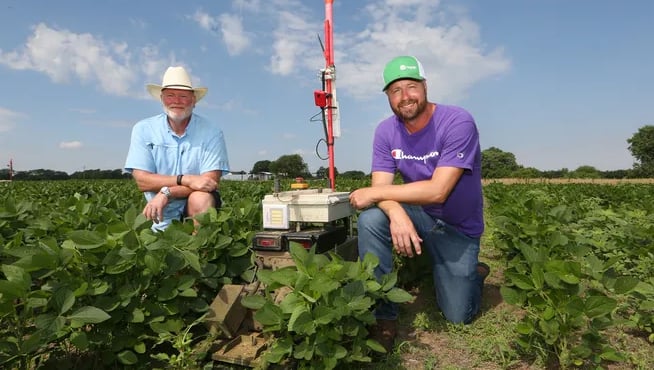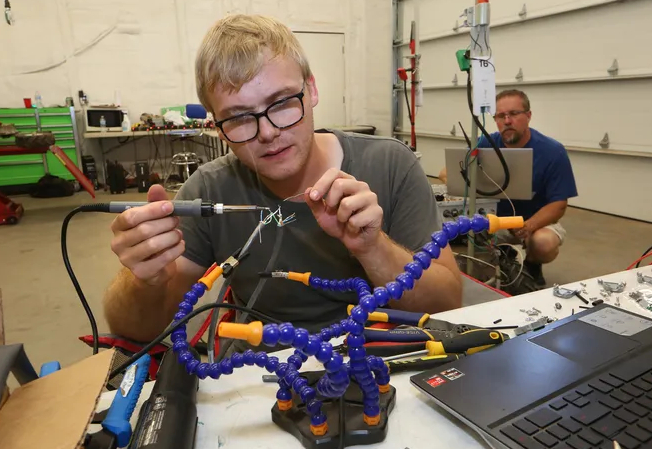May 30, 2025 | 10:19 GMT +7
May 30, 2025 | 10:19 GMT +7
Hotline: 0913.378.918
May 30, 2025 | 10:19 GMT +7
Hotline: 0913.378.918

Greenfield Robotics,. Photo: The Hutchinson News
For years, Kansas farmer Clint Brauer has struggled with keeping weeds out of his row crops. Along with keeping living roots in the ground, organic practices and no-till methods, he tried crimping — but the pigweeds just grew taller.
Three years ago, Brauer, an ex-California-based executive who farms in Haven and Cheney, decided to implement a wild plan, using robots to behead weeds.
"I realized there was no great way to get the weeds out at scale without chemicals," Brauer said. "I needed to invent one."
He started Greenfield Robotics.
Before chemicals replaced them, workers pulled weeds from the farm. Greenfield Robotics puts the "workers" back in the field with a new kind of worker — a mechanized one.
"We want to control weeds with labor and make it robot labor," Brauer said. "Robotics is our way of putting (mechanized) labor back into the farm."
More:Kansas wheat is set to deliver high yields and high quality
‘Our mission was always to get the chemicals out of farming’
The challenge for Brauer was he felt regenerative farming did not work for large fields without the heavy use of agrichemicals.
"I came up with the idea for it (a robot) and tested it manually," Brauer said. "No one knew if it would work. It has to fit between rows."
Brauer started up his company, Greenfield Robotics, on one of his family farms in Cheney in 2018. He currently uses the weeding bots running on other farmers' soybean crops in Harper, Reno, Rice and Sedgwick counties in central Kansas.
Along with soybean crops, Brauer hopes to work with sorghum, cotton and possibly canola farmers.
There is slightly under 90 million acres of soybeans planted across the U.S. this year, according to the USDA. During 2020, Kansas ranked seventh in soybeans planted, with more than 5 million acres. The Sunflower State follows Illinois, Iowa, Minnesota, North Dakota, Indiana and Missouri in soybean acreage.
"Our mission was always to get the chemicals out of farming," Brauer said. "There is no resistance to the spinning blade."
The robots, which travel from 1 to 3 mph, are water-resistant and weigh about 200 pounds. As they move between the crop rows, they cut down the weeds with their blades, leaving the chopped-up debris in their wake.
Although they are programed to stay in their lane, someone is monitoring them on a computer screen at all times.
Greenfield Robotics' leaders are going back to their roots
Both Brauer and Jerry Poole, the company's pr COO, grew up in Kansas. Brauer helped his father tend to their crops and cattle in Haven. Poole, who grew up in southeastern Kansas, spent time on his grandfather's hog and cattle ranch in Oklahoma.
Brauer, who had a successful career in start-ups and technical businesses in California, got together a top software engineer and several other key players to mount his company.
After a career in engineering and a brief health issue, Poole wanted to put his efforts into helping farmers, so he joined Brauer's team.
Food is medicine if it is grown without too many chemicals, Poole said. "Big agriculture are creating virtual poisons," he said.
Robots work better on farms using regenerative principles
Although the robots can be used on any type of farm, conventional or regenerative, it works better on a farm that is using regenerative principles — always having a living root in the ground, using cover crops, not tilling the field and having animals graze on the land. On his farm in Cheney, Brauer practices organic and regenerative principles and has a flock of sheep that he moves around the land.
Regenerative practices leave carbon in the soil. Because these practices hold more moisture in the soil, the robots have an easier time manipulating on the ground.

Nicholas Moehring, an electrical engineering intern from Wichita State University works on a robot. Photo: The Hutchinson News
A recent study performed by the Technical University of Munich (Technische Universität München) in Germany found plant residues, or roots left in the ground, are important for carbon storage.
According to Carsten Müller, Ph.D., at TUM, these roots can help ensure carbon is stored in the soil for longer.
"We plan to realign the interests of farmers and consumers with a food system that is economical and sustainable," Brauer said.
The company charges per acre at the same rate the farmer would pay for chemicals. It usually takes about three run-throughs per season for each crop, but that might change by climate. Brauer hopes to expand to other states.
"We work until they (the plant) canopy," Poole said. "We start post-emergence (of the crop)."
U.S. is one of the largest users of pesticides in the world
The U.S. is the world's largest producer and exporter of agricultural pesticides and one of the largest users — utilizing 1.2 billion pounds of pesticides in 2016, according to Nathan Donley, Ph.D., a researcher at the Center for Biological Diversity.
"We (the robots) are as effective as herbicides," Poole said. Unlike herbicides, robots do not need specific weather conditions, like rain, to work.
After starting his business, Brauer learned of Naio Technologies, a French startup, that uses robots to weed near garden vegetables. In 2011, the company introduced robots that work with mound-grown vegetables, especially lettuce. Recently, they introduced a robot that could work in vineyards.
"I really appreciated them," Brauer said. "They gave me good advice."
Brauer believes there is a lot of talent in the Sunflower State.
"I have a great team," he said. "Next year, we hope to grow by about ten times."
(The Hutchinson News )

(VAN) Vikas Rambal has quietly built a $5 billion business empire in manufacturing, property and solar, and catapulted onto the Rich List.

(VAN) Available cropland now at less than five percent, according to latest geospatial assessment from FAO and UNOSAT.

(VAN) Alt Carbon has raised $12 million in a seed round as it plans to scale its carbon dioxide removal work in the South Asian nation.

(VAN) Attempts to bring down the price of the Japanese staple have had little effect amid a cost-of-living crisis.

(VAN) Fourth most important food crop in peril as Latin America and Caribbean suffer from slow-onset climate disaster.

(VAN) Shifting market dynamics and the noise around new legislation has propelled Trouw Nutrition’s research around early life nutrition in poultry. Today, it continues to be a key area of research.

(VAN) India is concerned about its food security and the livelihoods of its farmers if more US food imports are allowed.